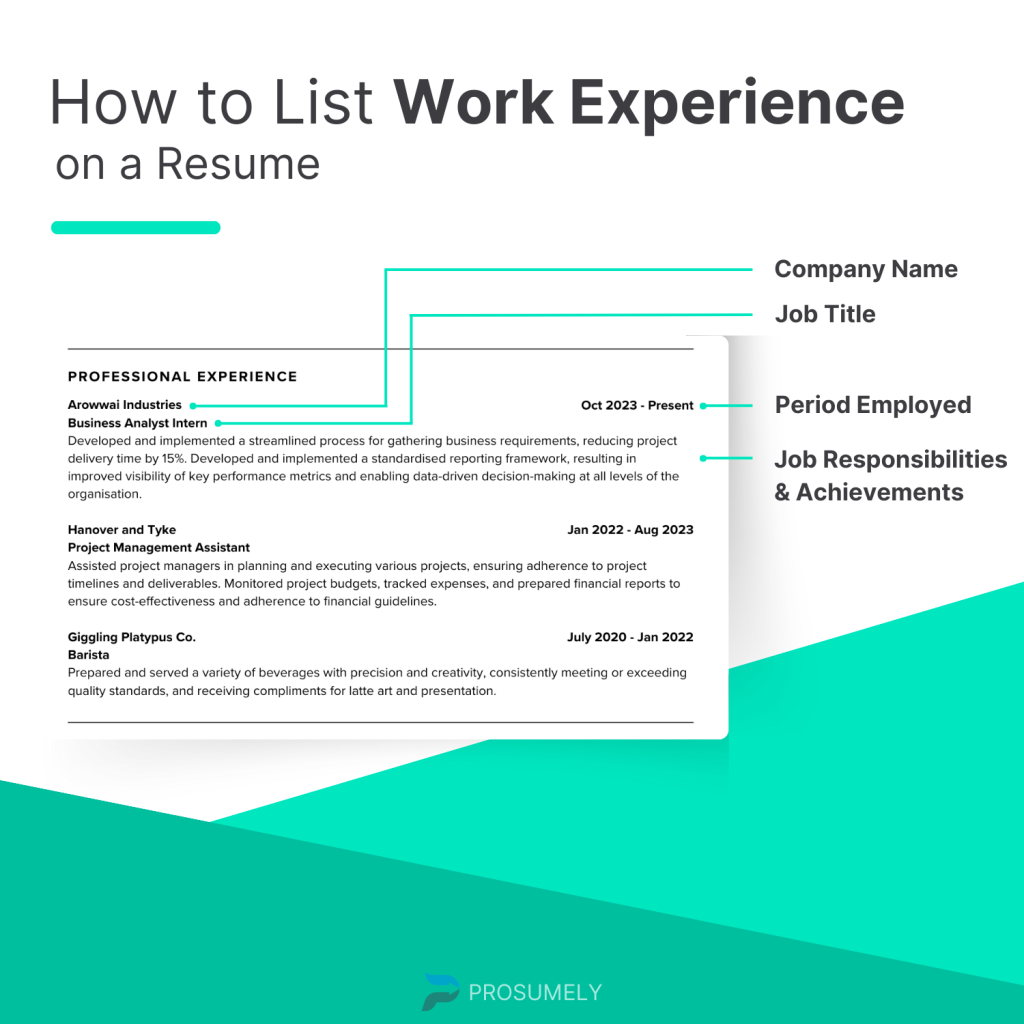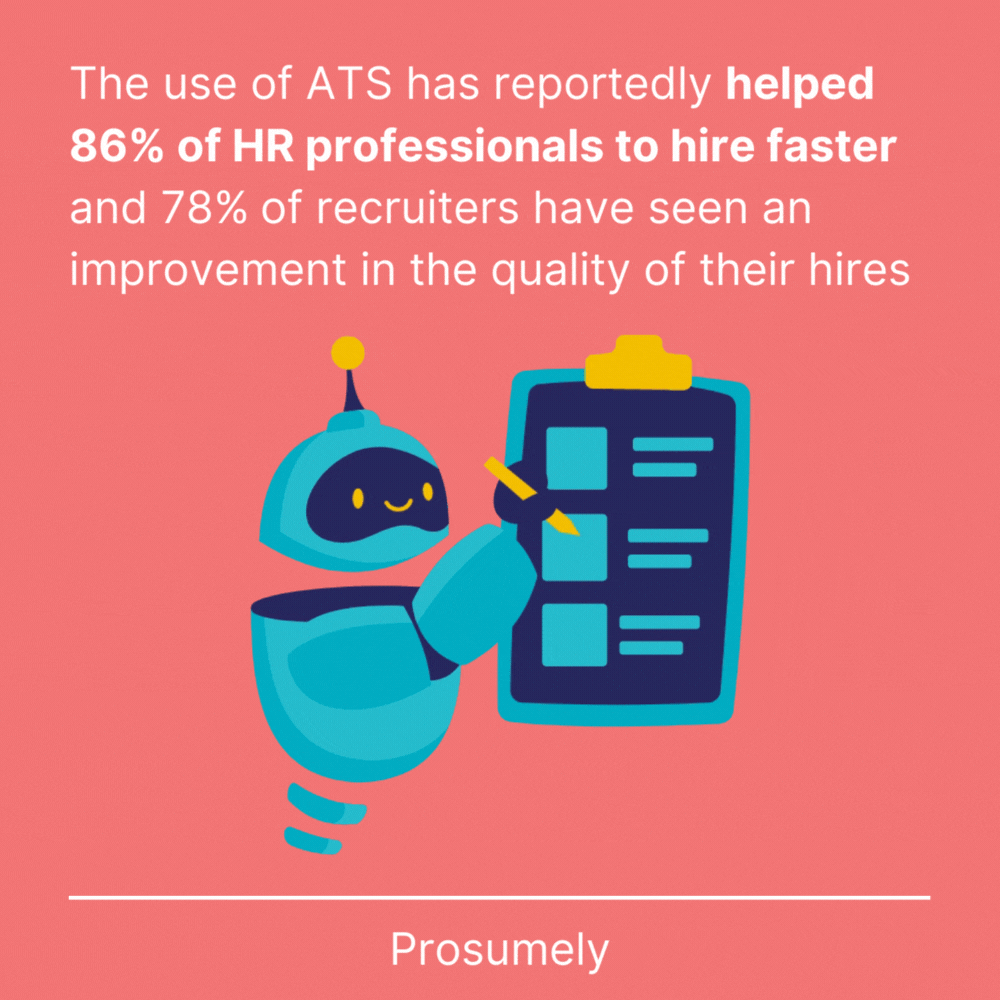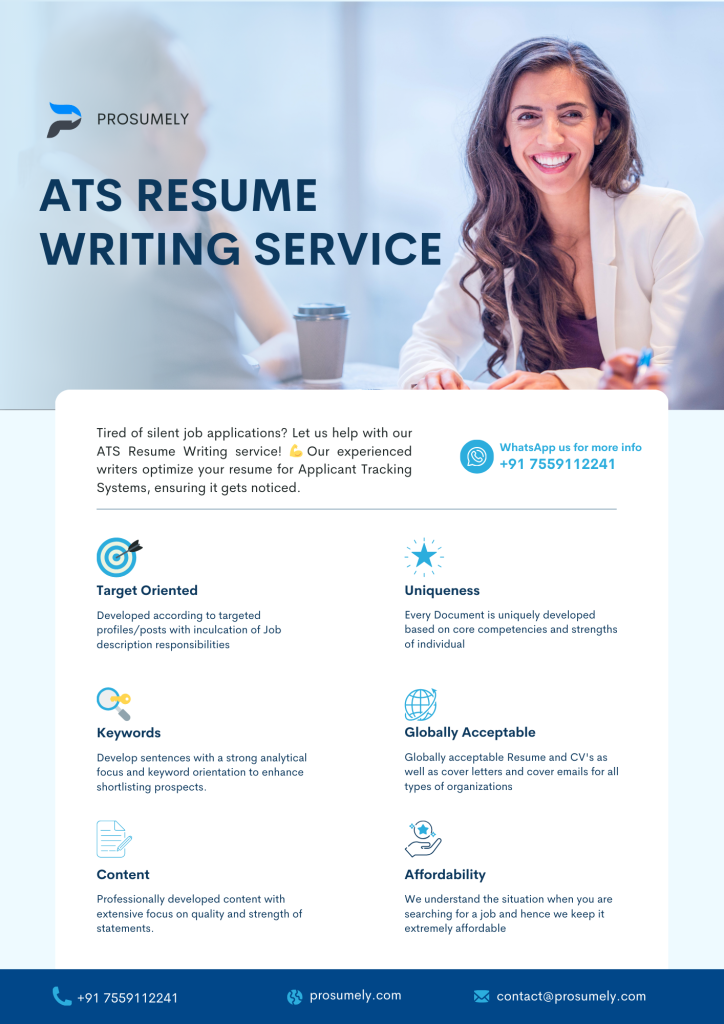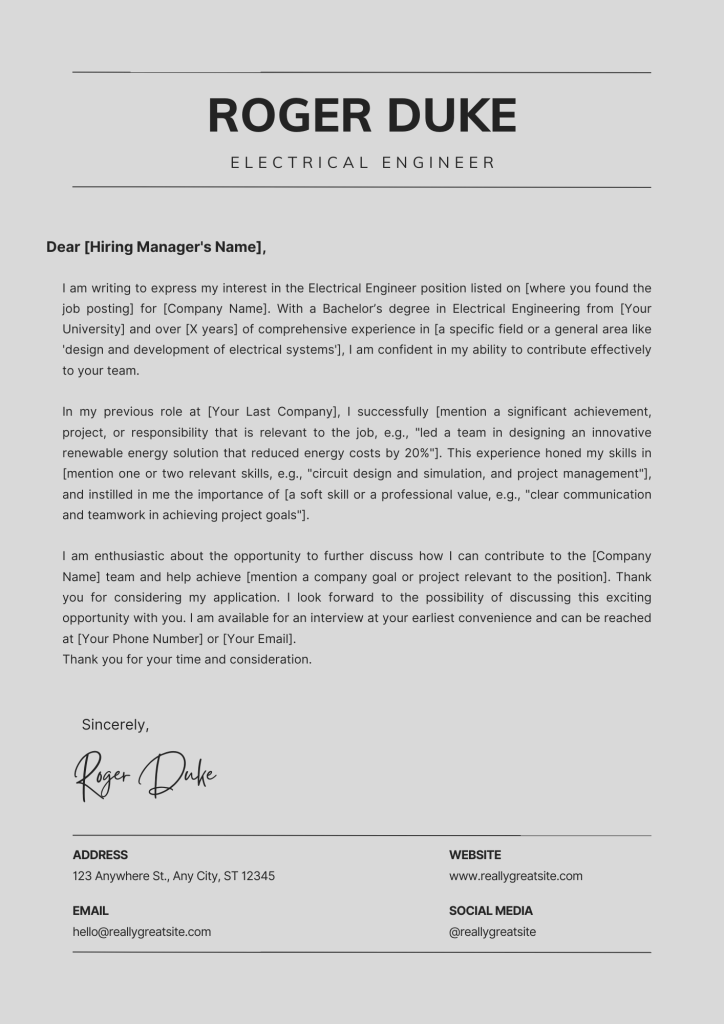Electrical Engineer Resume for 2024 | A Complete Guide
06 March | 10 min read

Creating an electrical engineer resume for 2024 requires a blend of showcasing technical skills, relevant experience, and soft skills in a manner that aligns with modern hiring practices and technological advancements.
This guide is designed to help you craft a electrical engineer resume that not only captures your unique expertise and accomplishments but also aligns with the expectations and trends of the industry in 2024.
Follow the steps in this article to develop a resume that creates an impact on the recruiter:
- Superior Electrical Engineer Resume Template (Outshining 90% of Competing Samples)
- Comprehensive Tutorial on Crafting Your Electrical Engineer Resume
- Top 25 Essential Skills to Feature in Your Electrical Engineer Resume
Get Your Resume Reviewed For FREE!
Our team of HR professionals, Industry Experts and Resume designers will review your CV/Resume
How to Write a Resume
Crafting a modern and impactful electrical engineer resume for 2024 involves highlighting your technical expertise, professional experience, and soft skills in a structured and reader-friendly format. When crafting a resume for a electrical engineer position, focusing on certain key points can significantly improve your chances of standing out. Here are 7-8 crucial tips to consider:
- Customize for the Job: Tailor your resume to the job description, emphasizing the skills and experiences that match the employer’s requirements. Use keywords from the job listing to pass Applicant Tracking Systems (ATS).
- Quantify Achievements: Whenever possible, use numbers to quantify your achievements, such as “Reduced energy consumption by 15% through optimized circuit design.”
- Highlight Technical Skills: Clearly list your technical skills, including software proficiencies (e.g., MATLAB, AutoCAD Electrical), coding languages, and specialized equipment knowledge.
- Include Soft Skills: Mention soft skills that are critical for electrical engineers, such as problem-solving, teamwork, and effective communication, demonstrating how they’ve impacted your work.
- Professional Experience: Use action verbs to describe your responsibilities and accomplishments. For each position, include your title, the company’s name, and the duration of employment.
- Education and Certifications: List your degrees, certifications, and any relevant training or licenses (e.g., PE license), especially those required or highly valued in the job posting.
- Projects and Portfolio: If applicable, include a section for significant projects or a portfolio link. Describe the project goal, your role, and the outcome, focusing on your contribution and the skills used.
- Format and Design: Ensure your resume is easy to read with a clean layout, consistent formatting, and professional font. Keep it to one or two pages, depending on your experience level.
Remember, your resume is your first impression. Making it relevant, concise, and clearly organized will help you stand out in the competitive field of electrical engineering.
Electrical Engineer Resume Examples
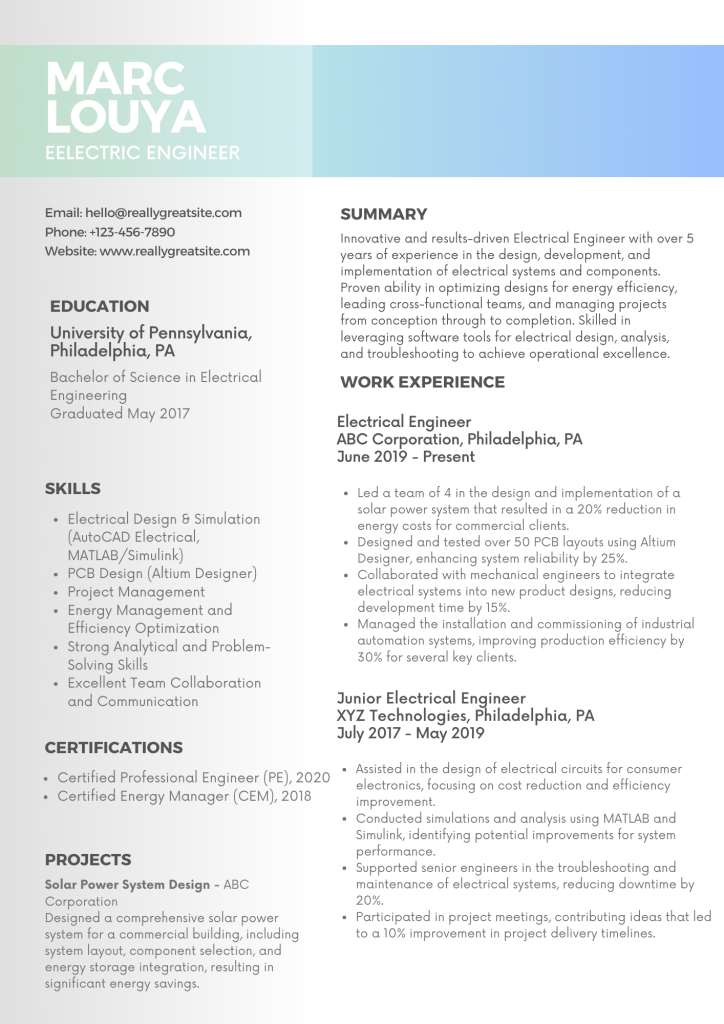
Why you should create your resume from a professional resume writer
Creating your resume with the help of a professional resume writer can offer several advantages, particularly in a competitive job market. Here are some reasons why considering a professional for your resume might be beneficial:
- Expertise: Professional writers craft impactful resumes that highlight your strengths effectively.
- Industry Trends: They stay updated on resume and recruitment trends, tailoring your resume to meet employer expectations.
- Objective View: Professionals offer an external perspective to better articulate your achievements and skills.
- Time-Saving: Outsourcing resume writing frees up your time for other job search activities.
- Customization: They provide personalized resumes, not generic templates, tailored to specific job applications.
- Error-Free: Ensure your resume is free of typos and formatting errors, presenting you professionally.
- Increased Interviews: Professionally written resumes can boost your chances of getting interviews.
Let our Resume Writers Develop your Resume!
✅ A dedicated professional to your CV ✅ ATS optimized ✅ Professionally structured & designed ✅ Free Cover Letter included ✅ Free Cover Email included ⌛ 48hrs delivery promise after payment 📄 Delivered in both PDF & Word format
How To Build Your Electrical Manager Resume in 9 Easy Steps
We’ve provided a glimpse of the ideal outcome.
Next, we’ll guide you through the necessary steps to craft the ultimate electrical Engineer resume!
#1. The right Resume Format for Electrical Engineer
Choosing the right resume format is crucial for a electrical engineer, as it can significantly impact how your skills, experiences, and achievements are perceived by potential employers. Here are three common resume formats, along with guidance on selecting the most suitable one for a Electrical Engineer role:
- Reverse-Chronological Format (Ideal for most candidates)
Description: This format lists your work history in reverse chronological order, starting with your most recent position at the top. It allows employers to see your career progression and recent accomplishments first.
Best for: Electrical Engineer with a clear career progression in electrical or related fields. It’s particularly effective if your recent roles are relevant to the job you’re applying for. - Functional (Skills-Based) Format
Description: Focuses on your skills and achievements rather than your job history. This format groups your experiences under skill categories, making it easier to highlight specific electrical competencies.
Best for: Individuals transitioning into a Electrical Engineer role from a different field, career changers, or those with gaps in their employment history. It’s also suitable for showcasing specific skills relevant to the job. - Combination (Hybrid) Format (Not Recommended)
Description: Combines elements of both the reverse-chronological and functional formats. It allows you to highlight your skills and achievements upfront, followed by a reverse-chronological work history.
Best for: Electrical Engineer with a robust set of skills and a strong work history. It’s ideal for those who want to showcase both their functional expertise and career progression.
Although each format has its merits, we suggest adhering to the reverse-chronological format. It’s the preferred choice among job seekers and hiring managers alike for several compelling reasons.
Here’s what it looks like:
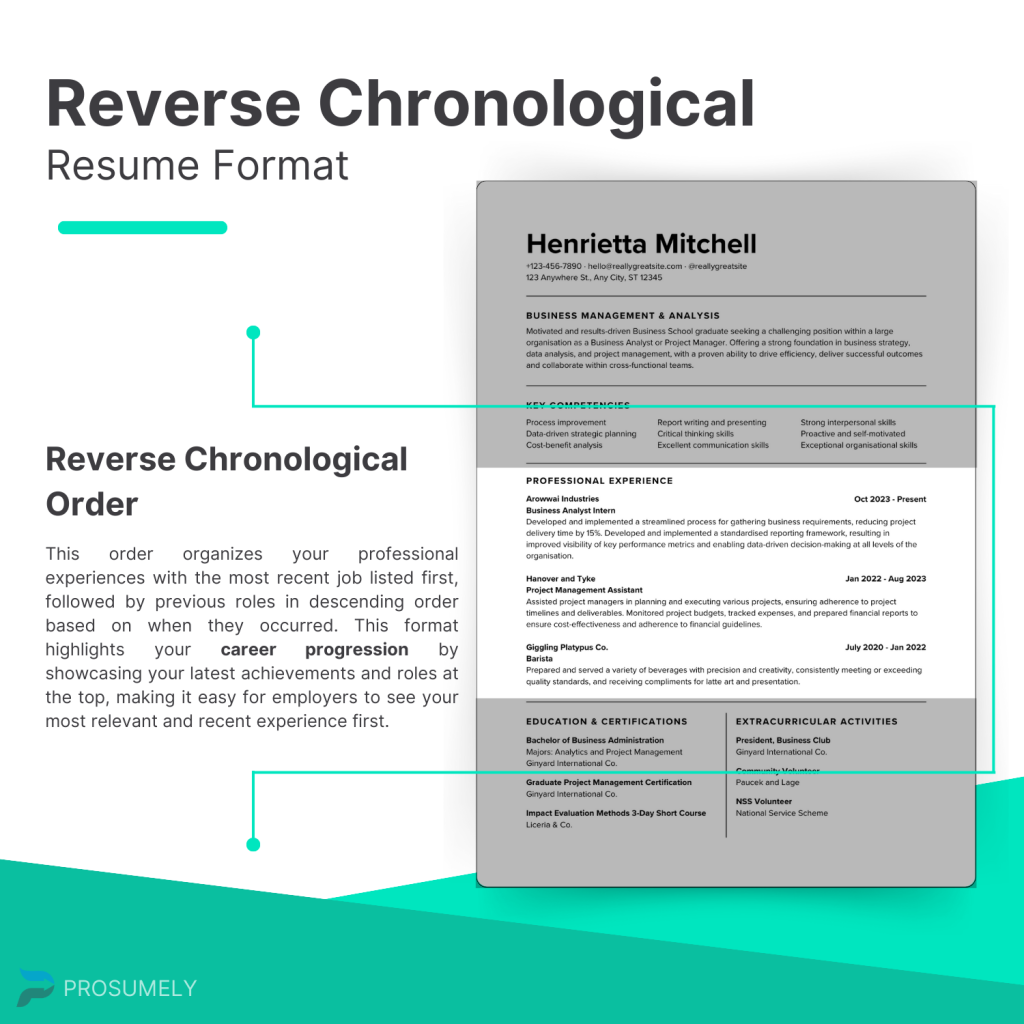
Add Value Preposition to your Resume
When adding a value proposition to your electrical engineering resume, you’re essentially showcasing your unique value and what you can bring to a potential employer. Here are five to six key points to help you do that effectively:
- Highlight Relevant Technical Skills: Clearly list your technical skills and proficiencies, especially those that are in high demand in the electrical engineering field, such as proficiency in specific engineering software (e.g., AutoCAD, MATLAB), coding languages (e.g., Python, C++), and knowledge of electrical codes and standards. Tailor this section to match the requirements of the job you’re applying for.
- Showcase Your Projects: Include a section dedicated to projects you’ve worked on. Detail your role, the technologies and methodologies you used, the challenges you overcame, and the outcomes. Quantifying your results (e.g., improved efficiency by 20%, reduced energy consumption by 15%) adds a powerful punch to your value proposition.
- Emphasize Soft Skills: While technical skills are crucial, don’t overlook your soft skills. Electrical engineering often requires teamwork, problem-solving in high-pressure environments, and effective communication with clients and team members. Highlight instances where your leadership, communication, or problem-solving skills made a tangible difference.
- Certifications and Continuous Learning: List any additional certifications or courses you’ve completed that are relevant to the field of electrical engineering. This demonstrates your commitment to staying current with industry trends and technologies, which is a valuable trait in the rapidly evolving engineering landscape.
- Tailor Your Resume to the Job Description: Use the job description as a guide to tailor your resume. Identify keywords and phrases used in the job listing and incorporate them into your resume where appropriate. This customization shows that you’re attentive and have taken the time to understand what the employer is looking for, thereby increasing the relevance of your value proposition.
Value Preposition Example for Electrical Engineer:
Experienced Electrical Engineer specializing in renewable energy and circuit design, with 8+ years driving project success and operational efficiency. Expert in power systems and energy management, I deliver innovative, scalable solutions that meet industry’s future needs. Committed to excellence, my work enhances system reliability, reduces costs, and propels technological advancement, adding significant value to your engineering projects.
Impactful Career Summary for Electrical Engineer Resume
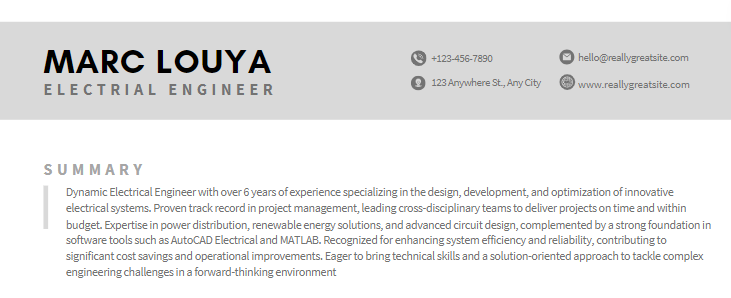
Writing an impactful career summary for an electrical engineer’s resume involves highlighting your most impressive achievements, skills, and experiences in a concise manner. Here are five to six key points to include:
- Years of Experience: Start by mentioning your years of professional experience in the electrical engineering field. This gives the employer a quick understanding of your level of expertise.
- Specialization Areas: Highlight your areas of specialization or the sectors you have worked in (e.g., power systems, renewable energy, automation, circuit design). This information helps to position you as a suitable candidate for roles that require specific expertise.
- Key Achievements: Include one or two of your most significant achievements in your career. Preferably, these should be quantifiable accomplishments such as successful projects completed, cost savings achieved, or improvements in efficiency or performance.
- Technical Skills: Briefly list the technical skills and engineering software you are proficient in, which are most relevant to the job you are applying for. This might include skills like expertise in CAD software, simulation tools, programming languages, or familiarity with industry standards.
- Professional Traits: Mention any professional traits or soft skills that make you stand out, such as problem-solving abilities, creativity in design, leadership in project management, or excellence in communication and teamwork.
- Educational Background: Though the career summary focuses mainly on professional experiences and skills, briefly mentioning your highest relevant educational credential (especially if it’s a degree in electrical engineering or a related field) adds to your credibility.
Career Summary Example for Electrical Engineer :
Dynamic Electrical Engineer with 6+ years in electrical system design and project management. Expert in power distribution and renewable energy, with strong AutoCAD Electrical and MATLAB skills. Proven ability to enhance system efficiency and drive cost savings. Aims to tackle engineering challenges in a forward-thinking environment.
Add Core Competencies to your Resume
For an Electrical Engineer, core competencies are crucial for job performance and career advancement. Here’s a condensed list of essential skills:
Technical Knowledge
- Circuit Design: Crafting and analyzing electrical circuits.
- Electrical Systems: Designing and maintaining systems and controls.
- Power Systems: Expertise in electric power generation and distribution.
- Renewable Energy: Developing solar, wind, and other renewable systems.
- CAD Software: Using AutoCAD Electrical for electrical schematics.
- Simulation Tools: Employing tools like MATLAB for system analysis.
Problem-Solving and Analytical Skills
- Problem Solving: Tackling complex issues with effective solutions.
- Analytical Thinking: Logical analysis to determine action paths.
Project Management
- Execution: Leading projects with precise planning and risk management.
- Teamwork: Collaborating across disciplines to meet project objectives.
Communication
- Technical Writing: Clear, concise technical information delivery.
- Collaboration: Effective team communication and cooperation.
Adaptability and Continuous Learning
- Industry Trends: Staying updated with technological advancements.
- Flexibility: Adapting to new technologies and methods.
Regulatory Knowledge
- Compliance: Understanding electrical codes and safety standards.
These competencies blend technical expertise with soft skills, ensuring Electrical Engineers can effectively contribute to and lead engineering projects.
Allow Our Expert Resume Writers to Craft Your Resume!
✅ A dedicated professional to your CV ✅ ATS optimized ✅ Professionally structured & designed ✅ Free Cover Letter included ✅ Free Cover Email included ⌛ 48hrs delivery promise after payment 📄 Delivered in both PDF & Word format
Add Personal Competencies to your Resume
Personal competencies are the personal attributes or soft skills that enable you to interact effectively and harmoniously with other people. Important ones for a Electrical Engineer might include leadership, communication, and creativity.
How to Add:
- While personal competencies are often woven into the professional summary and work experience sections, you can also list them explicitly if they are particularly strong or relevant.
- Highlight these skills in the context of how they helped you achieve results or contributed to your role as a Electrical Engineer.
- Example: Leadership, Effective Communication, Creative Problem-Solving, Team Collaboration, Adaptability.
Examples of How to List Competencies
Core Competencies: Proficient in electrical circuit design, power systems analysis, and control systems. Skilled in CAD software, troubleshooting, and project management.
Personal Competencies: Analytical thinker with strong attention to detail, excellent communication, adaptability, and teamwork skills. Committed to continuous learning and effective time management.
Technical Competencies: Proficient in the design and simulation of electrical systems using AutoCAD, SolidWorks, and MATLAB.
Tips:
- Tailor your competencies to match the job description, focusing on the skills that are most valued for the role you’re applying for.
- Provide context for how you’ve applied these competencies in your professional experience section, using specific examples and quantifiable results to demonstrate your proficiency.
How to Add Work Experience to Electrical Engineer Resume
What to Include in Your Work Experience Section:
Include below points in your work experience:
- Position Held. Place your role at the forefront of each employment section. This ensures that a hiring manager immediately recognizes your relevant experience.
- Employer’s Name and Location. Include the company’s name along with its city and state or country. If the organization is not widely recognized, a brief description might be necessary.
- Period of Employment. Indicate the duration of your tenure with month and year, without needing to specify exact start and end dates.
- Key Accomplishments and Duties. The essence of your work experience lies here. Tailor this section to highlight significant achievements or responsibilities, pertinent to your industry, in bullet points for clarity and ease of reading.
Here’s a real-life example:
Correct Examples:
- Led a team of 5 engineers in designing and deploying a state-of-the-art power distribution system, improving system efficiency by 20%.
- Spearheaded the integration of renewable energy sources, reducing carbon footprint by 35%.
- Managed projects worth over $2M from concept through to completion, under budget and ahead of schedule.
- Utilized AutoCAD and SolidWorks for detailed electrical design, enhancing design accuracy by 25%.
- Conducted comprehensive system analyses using MATLAB, resulting in a 15% reduction in energy wastage.
- Mentored junior engineers, improving team productivity and knowledge sharing.
Wrong Examples:
- Did electrical engineering work.
- Developed and Worked on various projects.
- Develop and Used some engineering software.
- Dealt with electrical systems.
- Helped with some company projects, learned a lot.
- Analyze the effectiveness of campaigns and adjust strategies accordingly and attended meetings and worked with other engineers.
Ideal Electrical Engineer Resume Length
For a electrical engineer, the ideal resume length is generally one to two pages. The appropriate length can depend on several factors, including the extent of your experience, the relevance of your background to the job you’re applying for, and the industry’s standards. Here’s a brief guideline:
One-Page Resume
Best for: Electrical engineer with less than 10 years of experience, or those in the early to mid-stages of their careers. A one-page resume forces you to be concise and highlight only the most relevant achievements and skills.
Focus on: Summarizing your core competencies, significant achievements, and relevant educational background. Tailor the content to the job description, ensuring that every line demonstrates value to potential employers.
Two-Page Resume
Best for: Experienced electrical engineer with more than 10 years of experience or those with extensive projects, achievements, and roles that are directly relevant to the job they are applying for.
Focus on: Providing a detailed account of your career progression, including leadership roles, major projects, and specific results that showcase your impact on past employers. Also, include certifications, professional development courses, and technical skills relevant to the role.
Key Considerations:
- Relevance Over Length: Always prioritize the relevance and quality of the information over trying to fill space. It’s more effective to have a well-crafted one-page resume than a two-page resume filled with less relevant details.
- Tailor Your Resume: Adjust your resume for each application based on the job description. Highlight experiences and skills that match the employer’s requirements.
- Format Wisely: Use a clean, professional format that makes efficient use of space. Bullet points, concise language, and strategic use of headings can help fit more information in a smaller space without sacrificing readability.
Leverage Optional Resume Sections
The essential elements we’ve discussed are indeed the core components of any resume, functioning as the foundational pieces for any job application. Achieving proficiency in these areas significantly enhances your prospects of securing the positions you seek.
Should you find yourself with additional space, there are several supplementary sections you might consider to enrich your resume:
- Certifications or Awards: Detail any professional certifications, accolades, or recognitions that attest to your expertise or outstanding achievements in your field.
- Volunteer Work: Include relevant volunteer experiences that demonstrate transferable skills or a commitment to your community.
- Languages: List any additional languages you speak and your level of proficiency. This can be particularly advantageous in roles requiring multilingual communication.
- Hobbies and Interests: Share interests that are pertinent to the job or highlight unique skills and personal diversity.
- Publications or Presentations: Cite any relevant scholarly articles, books, or professional presentations that can underline your expertise and knowledge in the industry.
- Professional Memberships: Mention your affiliation with any professional organizations that enhance your network and indicate your active participation in your professional community.
These optional sections can offer a more comprehensive view of your capabilities and interests, potentially setting you apart from other candidates.
Allow Our Expert Resume Crafters to Transform Your Resume!
✅ A dedicated professional to your CV ✅ ATS optimized ✅ Professionally structured & designed ✅ Free Cover Letter included ✅ Free Cover Email included ⌛ 48hrs delivery promise after payment 📄 Delivered in both PDF & Word format
Consider Applicant Tracking System (ATS) Software
Around 75% of recruiters and hiring managers use some form of ATS software to facilitate their hiring processes, and this is even more prevalent among Fortune 500 companies, with 98% using ATS to find potential candidates
Nowadays, the majority of organizations rely on Applicant Tracking Systems (ATS) to analyze and sort through vast numbers of resumes quickly. These systems are set to filter out applications that fail to match the set requirements.
For instance, the absence of certain skills or non-compliance with the expected resume format can trigger an ATS to disqualify an application from the selection process.
Creating a resume that navigates through Applicant Tracking Systems (ATS) can be straightforward with the right approach.
Here are some strategies to enhance your resume’s ATS compatibility:
- Aim for brevity and relevance by maintaining your resume length to the commonly preferred one-page format, especially when job specifications indicate a length requirement. An overly extended resume may risk being automatically excluded.
- Embedding job-specific keywords into your resume is crucial. Scrutinize the job listing to identify the competencies and expertise the employer is seeking. Integrating these terms, especially in the context of your professional experiences and accomplishments, will align your resume more closely with the employer’s needs.
- Emphasize clarity and directness by employing an active voice to convey your professional experiences. For example, “Directed a sales team” is more concise and stronger than “Was in charge of a sales team.”
- Opt for dynamic verbs that convey leadership and initiative. Words like “orchestrated,” “championed,” or “executed” can make your resume stand out and portray your role in a proactive light, as opposed to more passive phrases like “was responsible for.”
These tips can significantly improve the likelihood that your resume will not only be recognized by an ATS but also demonstrate your qualifications effectively to potential employers.
Top skills & competencies to add in your resume
Strategic Skills
- Market Research & Analysis
- Strategic Planning & Execution
- Brand Management & Development
- Customer Segmentation & Targeting
- Competitive Analysis
- Product Launch & Positioning Strategies
- Budget Management & ROI Optimization
Digital Marketing Skills
- SEO (Search Engine Optimization) & SEM (Search Engine Marketing)
- Content Marketing & Strategy
- Social Media Management & Strategies
- Email Marketing
- Digital Advertising (PPC, Display Ads)
- Web Analytics & Google Analytics
- CRM Software Proficiency
Creative Skills
- Creative Campaign Development
- Graphic Design Basics (understanding of tools like Adobe Creative Suite)
- Copywriting & Content Creation
- Visual Storytelling & Brand Narratives
- Communication & Interpersonal Skills
- Team Leadership & Management
- Cross-functional Collaboration
- Effective Communication (Oral & Written)
- Negotiation & Persuasion
- Problem-solving & Decision Making
- Adaptability & Flexibility
- Project Management
Technical Skills
- Proficiency in Marketing Automation Tools (e.g., HubSpot, Marketo)
- Knowledge of CMS (Content Management Systems)
- Data Analysis & Interpretation
- Understanding of E-commerce Platforms
- Familiarity with SEO and Web Development Tools
Additional Skills
- Customer Relationship Management (CRM)
- Event Planning & Management
- Public Relations & Media Outreach
- Influencer Marketing
Electrical Engineer Cover Letter
Crafting a compelling cover letter is crucial for a electrical engineer application. It’s your opportunity to introduce yourself, highlight key aspects of your resume, and explain why you’re the ideal candidate for the position. Here’s a sample cover letter tailored for a electrical engineer role:
Electrical Engineer Cover Letter Example
Electrical Engineer LinkedIn Profile
- Profile Photo: Use a professional, high-resolution image where your face is clearly visible.
- Background Photo: Select an image that reflects your professional brand or the industry you’re in.
- Headline: Go beyond just your job title. Include your specialization and a value you bring. For example, “electrical engineer | Digital Strategy & Brand Development Expert | Driving Growth Through Innovative Campaigns”.
- About Section: Begin with a strong statement that summarizes your professional identity. Outline your key skills, specializations, and what sets you apart from others. Highlight significant achievements with quantifiable results. Mention your approach or philosophy towards marketing and leadership. Keep it concise, engaging, and written in the first person.
- Experience Section: List your roles in reverse-chronological order. For each position, provide a brief description of your role and key responsibilities. Highlight achievements with specific outcomes, such as “Led a digital marketing campaign that increased web traffic by 30% within 3 months”. Use bullet points for readability and to make it easy for readers to scan through your accomplishments.
- Skills & Endorsements: Include a mix of core, technical, and personal competencies relevant to a electrical engineer role, such as strategic planning, SEO/SEM, leadership, and communication. Regularly update this section to reflect your current skill set.
- Recommendations: Seek recommendations from colleagues, supervisors, or clients who can vouch for your skills and accomplishments.
Offer to reciprocate with a thoughtful recommendation. - Accomplishments: Include any awards, certifications, publications, or speaking engagements that demonstrate your expertise and contributions to the field.
- Engage with Your Network: Regularly share and comment on industry-related content to demonstrate your engagement and expertise. Publish articles or posts that reflect your professional insights or experiences.
- Custom URL: Customize your LinkedIn URL to make it easy to remember and share. Ideally, it should include your name and profession.
- Contact Information: Ensure your contact information is up-to-date so potential employers or networking connections can reach you easily.
Develop your LinkedIn Profile from our Experts
✅ A dedicated professional to develop your profile ✅ SEO optimized so you rank higher in recruiter’s searches ✅ Aligned with your CV ✅ Professionally structured & designed ⌛ 48hrs delivery promise after payment
Key Takeaways
- Quantification Matters: Whether it’s in resumes, presentations, or project summaries, providing specific, quantifiable outcomes (e.g., “increased sales by 30%”, “reduced customer churn by 20%”) significantly enhances credibility and illustrates your impact concretely.
- Continuous Learning and Adaptation: Staying updated with industry trends, technological advancements, and best practices is crucial across professions. Adaptability and a commitment to continuous learning are indispensable for staying competitive and innovative.
- Customization is Key: Tailoring content to the audience or specific requirements—be it a resume for a job application, a marketing campaign for a particular demographic, or communication strategies for different stakeholders—increases relevance and effectiveness.
Meet our Resume Writers

Angela
10+ years of experience writing Executive resumes for candidates in USA, EU, UK. Developed more than 685+ resumes till date.

Kevin
12+ years of experience writing ATS resumes for candidates in USA, EU, UK. Developed more than 900+ resumes till date.

Sayd
8+ years of experience writing ATS resumes for candidates in KSA, UAE, Qatar, other middle east countries. Developed more than 900+ resumes till date.

